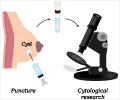The occurrence of epimutations early in pregnancy challenges traditional theories related to carcinogenesis and the risk of developing breast cancer.

Prenatal BRCA1 epimutations contribute significantly to triple-negative breast cancer development
Go to source) Cancer is a major health challenge worldwide, affecting many lives. Despite progress in understanding its causes, most cancer forms, including breast cancer, continues to increase in many countries.
‘Link between specific epimutations within the BRCA1 gene and an increased susceptibility to triple-negative breast cancer (TNBC) identified. #breastcancer #mutations #womencancer’





Scientists have been looking closely at both genes and the environment, trying to figure out what sets the stage for cancer. One interesting area of study is something called "epimutations." Instead of changes to the actual genes, these are changes in how our genes are turned on or off. “This higher risk was found despite the fact that epimutations affected a very small portion of normal cells in the affected individuals”, says professor Per Eystein Lønning.
Unraveling Epimutations in Breast Cancer
While this was a breakthrough, it left the researchers wondering when and where these epimutations happen. In a new study now featured in the journal Genome Medicine the Bergen Group, and to be presented at the international SABCS, the worlds largest breast cancer conference in San Antonio on December 6, in collaboration with other Norwegian researchers, the Bergen researchers dug deeper. Analysing DNA from both breast tissue and white blood from over four hundred breast cancer patients, they made several important discoveries providing new light on the subject.For many cases of TNBC, BRCA1 gene epimutations were found in both the white blood cells and tumour tissue. Moreover, epimutations in the white blood cells and tumour tissue from the same individual revealed the same profile.
“This suggests they might have a common cell origin, possibly occurring very early during pregnancy”, says Lønning.
The findings also indicate that as many as around 20 per cent of all TNBC may arise from the small group of normal tissue cells carrying BRCA1 epimutations.
Advertisement
“The fact that epimutations might be happening early during pregnancy challenges conventional theories on carcinogenesis and cancer risk. Moreover, the fact that they occur twice as common in girls than boys reveal an important gender difference not previously recorded”, says Lønning.
“Understanding this could potentially be a game-changer in how we approach and prevent cancer in the future”, Lønning concludes.
Reference:
- Prenatal BRCA1 epimutations contribute significantly to triple-negative breast cancer development - (https://genomemedicine.biomedcentral.com/articles/10.1186/s13073-023-01262-8)















